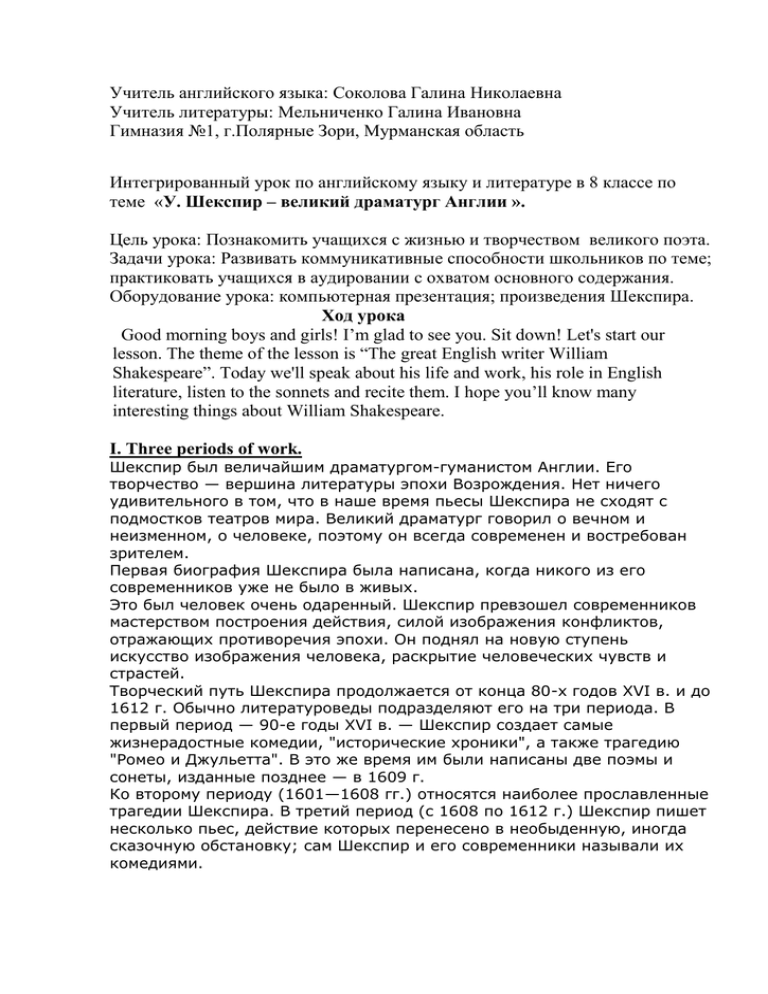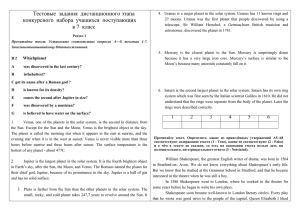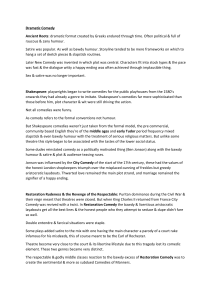Соколова Г.Н.Интегрированный урок по теме
advertisement

Учитель английского языка: Соколова Галина Николаевна Учитель литературы: Мельниченко Галина Ивановна Гимназия №1, г.Полярные Зори, Мурманская область Интегрированный урок по английскому языку и литературе в 8 классе по теме «У. Шекспир – великий драматург Англии ». Цель урока: Познакомить учащихся с жизнью и творчеством великого поэта. Задачи урока: Развивать коммуникативные способности школьников по теме; практиковать учащихся в аудировании с охватом основного содержания. Оборудование урока: компьютерная презентация; произведения Шекспира. Ход урока Good morning boys and girls! I’m glad to see you. Sit down! Let's start our lesson. The theme of the lesson is “The great English writer William Shakespeare”. Today we'll speak about his life and work, his role in English literature, listen to the sonnets and recite them. I hope you’ll know many interesting things about William Shakespeare. I. Three periods of work. Шекспир был величайшим драматургом-гуманистом Англии. Его творчество — вершина литературы эпохи Возрождения. Нет ничего удивительного в том, что в наше время пьесы Шекспира не сходят с подмостков театров мира. Великий драматург говорил о вечном и неизменном, о человеке, поэтому он всегда современен и востребован зрителем. Первая биография Шекспира была написана, когда никого из его современников уже не было в живых. Это был человек очень одаренный. Шекспир превзошел современников мастерством построения действия, силой изображения конфликтов, отражающих противоречия эпохи. Он поднял на новую ступень искусство изображения человека, раскрытие человеческих чувств и страстей. Творческий путь Шекспира продолжается от конца 80-х годов XVI в. и до 1612 г. Обычно литературоведы подразделяют его на три периода. В первый период — 90-е годы XVI в. — Шекспир создает самые жизнерадостные комедии, "исторические хроники", а также трагедию "Ромео и Джульетта". В это же время им были написаны две поэмы и сонеты, изданные позднее — в 1609 г. Ко второму периоду (1601—1608 гг.) относятся наиболее прославленные трагедии Шекспира. В третий период (с 1608 по 1612 г.) Шекспир пишет несколько пьес, действие которых перенесено в необыденную, иногда сказочную обстановку; сам Шекспир и его современники называли их комедиями. II. The age of Shakespeare. The last half of the 16th and the beginning of the 17th centuries are known as the golden age of English literature. It was the time of the English Renaissance and sometimes it is even called “the age of Shakespeare”. By that time England had become a powerful state, English trade was flourishing. The yoke of the feudal barons had been thrown off. New branches of science were developing. At the same time there was no change for the better in the life of the English people, and the power of gold grew stronger. Shakespeare saw these contradictions and reflected them in his works. William Shakespeare, the greatest and most famous of English writers, and probably the greatest playwright who has over lived, was born on April 23, 1564 in the town of Stratford-upon-Avon, Warwickshire. III. Stratford-upon-Avon (slide). William lived in Stratford until he was about twenty-one, when he went to London. We do not know why he left Stratford-on-Avon. We know absolutely nothing about his life for the next seven years. There is a story that Shakespeare's first job in London was holding rich men's horses at the theatre door. But nobody can be sure that this story is true. IV.William’s family and house (slide). His father, John Shakespeare, was a glove maker and a dealer in wool and other farm products and he had several houses in Stratford. He was a respected figure in Stratford. William's mother, Mary Arden, was a farmer's daughter of Wilmcote, near Stratford. V.Shakespeare’s childhood (slide). In his childhood William went to the Grammer School where, besides reading and writing, he was taught Latin, Greek, and other subjects. When he had free time he liked to go to the forest and to the river. When actors visited Stratford William liked to watch them. He was interested in that profession and decided to become an actor himself. But it was not so quick. In 1582 at just over eighteen Shakespeare married Anne Hathaway, a farmer’s daughter. His wife was eight years older then William. He had got three children. VI. The Globe Theatre (slide). The famous Globe Theatre was the centre of London theatrical life. Shakespeare played on its stage and he wrote plays for this theatre. Poor people walked to the Globe Theatre and rich people came in boats across the river Thames, or took cabs. The performances were given in the day-time, and there was no scenery. Shakespeare wrote most of his plays for the Globe Theatre. Now I'll tell you what the theatre of the 16th century was like. In the middle, there was a kind of house. There the actors dressed and kept the things which were used in the performance. In front of it there was a platform. This platform, together with the balcony over it, was the stage on which the actors played. They came out of the house to the stage through two large doors. In front of the stage was a large yard. Round the yard there were three balconies, one over the other. Both these balconies and the yard were for the people who came to see the performance. The yard and the greater part of the stage were open to the sky. The actors were often very good. They could play, sing and dance. Women's parts were played by boys or young men. An actor often played two or three parts in one performance. Music was very important. The performance began at three o'clock. From its beginning till it was over, people could see a flag over the theatre. The people of London loved their theatre very much. Everybody went to the theatre in London - both young and old, rich and poor. Those who could not pay much for their tickets stood in the yard. If they were tired they could sit on the ground. Rich men and their wives sat in the balconies, and aristocrats were allowed to sit on the stage. People had no newspapers, no radio or television in those days. That is why the theatre played a great part in their lives. The performance gave them great enjoyment, but they came to the theatre not only for pleasure, they came to hear the news, to learn something of the history of England or of some other country. They were taught the great science of life there. VII. The Royal Shakespeare Theatre (slide). Shakespeare was a good friend to his comrades in the theatre. The theatre at that time was more closely connected with the people than any other art. All kinds of Londoners went to the theatre and were very fond of it. Shakespeare's experience as an actor (although he usually acted only small parts like the Ghost in Hamlet) helped him greatly in the writing of his plays. His knowledge of the stage and his poetical genius made his plays the most wonderful ones ever written. VIII. Shakespeare’s sonnets (slide, record with English sonnets and Pugachova’s song). Sonnet 116 Let me not to the marriage of true minds Admit impediments. Love is not love Which alters when it alteration finds, Or bends with the remover to remove. 0 no, it is an ever-fixed mark, That looks on tempests, and is never shaken; It is the star to every wandering bark, Whose worth’s unknown, although his height be taken. Сонет 116 Мешать соединенью двух сердец Я не намерен. Может ли измена Любви безмерной положить конец? Любовь не знает убыли и тлена. Любовь — над бурей поднятый маяк, Не меркнущий во мраке и тумане, Любовь — звезда, которою моряк Определяет место в океане. Любовь — не кукла жалкая в руках У времени, стирающего розы Love’s not Time’s fool, though rosy lips and cheeks Within his bending sickle's compass come; Love alters not with his brief hours and weeks, На пламенных устах и на щеках, И не страшны ей времени угрозы. А если я не прав и лжет мой стих, — То нет любви и нет стихов моих! But bears it out even to the edge of doom. If this be error, and upon me proved, 1 never writ5, nor no man ever loved. Сонет 65 Уж если медь, гранит, земля и море Не устоят, когда придет им срок, Как может уцелеть, со смертью споря, Краса твоя — беспомощный цветок? Как сохранить дыханье розы алой, Когда осада тяжкая времен Незыблемые сокрушает скалы И рушит бронзу статуй и колонн? О, горькое раздумье!.. Где, какое Для красоты убежище найти? Как, маятник остановив рукою, Цвет времени от времени спасти?.. Надежды нет. Но светлый облик милый Спасут, быть может, черные чернила! Сонет 130 Её глаза на звёзды не похожи, Нельзя уста кораллами назвать, Не белоснежна плеч открытых кожа, И чёрной проволокой вьётся прядь. С дамасской розой, алой или белой, Нельзя сравнить оттенок этих щёк. А тело пахнет так, как пахнет тело, Не как фиалки нежный лепесток. Ты не найдёшь в ней совершенных линий, Особенного света на челе. Не знаю я, как шествуют богини, Но милая ступает по земле. И всё ж она уступит тем едва ли, Кого в сравненьях пышных оболгали. IX.Works of Shakespeare (slide). Shakespeare wrote 37 plays. Among them there are deep tragedies, such as Hamlet, King Lear, Othello, Macbeth, light comedies, such as The Merry Wives of Winu-sor6 All's Well That Ends Well, Twelfth Night, Much Ado About Nothing,7 historical dramas, such as Henry IV, Richard III. Most of Shakespeare's plays were not published in his life-time. So some of them may have been lost in the fire when the "Globe" burned down in 1613. X. Shakespeare’s festival (slide). Shakespeare's belief in man was the source of his optimism which we can feel in even his blackest tragedies. Shakespeare was a great writer. He wrote many different kinds of plays. In his plays he could write equally well funny scenes, and scenes of fear and excitement. The characters in Shakespeare's plays do not seem like "characters in a book", but as if they were real people whom we could recognize at once if we met them in ordinary life instead of in the play. In fact, the names of some of Shakespeare's characters, such as Hamlet, Othello, Romeo and many others, are known even to people who have never seen the plays in which they appear. XI. The last years of life (slide). Shakespeare spent the last years of his life at Stratford where he died in 1616. He was buried in the church of Stratford. A monument was erected to the memory of the great playwright in the Poet's Corner in Westminster Abbey. Shakespeare was a great humanist. His belief in the high and noble features of man's mind and heart was the foundation of his great humanism.] XII. Shakespeare’s monument (slide). XIII. Complete the sentences (slide). XIV. The role of Shakespeare in literature. Творчество Шекспира сыграло важную роль в культурной жизни последующих веков. Его произведения были переведены на множество языков, выдержали многочисленные постановки в театрах разных стран и с волнением воспринимались зрителями спустя века после его смерти. В различные эпохи передовые литературные деятели опирались на принципы шекспировского реализма в борьбе против реакционных направлений в литературе. Величайшие русские писатели и критики высоко ценили творчество Шекспира и высказали о нем ряд чрезвычайно глубоких суждений. Пушкин, а затем Белинский, боровшиеся за реалистический и демократический путь развития русской литературы, особенно дорожили наследием Шекспира. Пушкин указывал на народность Шекспира, на отличие "народных законов драмы шекспировской" от драматургии классицизма. Он же отметил живость и многосторонность шекспировских образов, "широкое и вольное изображение характеров". Лучшие произведения Шекспира идут на сценах наших отечественных театров. Они стали достоянием широкой публики. Большую известность приобрели фильмы Григория Козинцева "Гамлет" и "Король Лир". На тему "Ромео и Джульетты" Сергеем Прокофьевым написана музыка к одноименному балету. Исполнением роли Джульетты в Большом театре прославилась Галина Сергеевна Уланова. Творчество Шекспира составляет целую эпоху в развитии мировой драматургии. Шекспир достиг величайшей для своего времени глубины в изображении больших исторических противоречий, борьбы старого с новым. В титанических образах он запечатлел борьбу темного и светлого начала как в обществе, так и в самом человеке. Поэтому его произведения не теряют своей остроты и всегда воспринимаются читателями и зрителями с большим интересом и волнением. XV. Summing up. Our lesson is over. You have worked very well today. I hope you liked the lesson. Your marks are good and excellent. Thank you. See you tomorrow. Bibliography. 1.http://www.ptsagency.ru/cgi-bin/tourprices.cgi?group_id=0&tour_id=4758&tour_date=200809-03&allquote=1 2.http://stroifoto.ru/page/234 3.http://www.fotobank.ru/image/R027-3660.html 4.http://www.england-hotel.ru/hotels/stratford-apon-ejjvon/page-2/ 5.http://tourbizua.com/news/item/4187 6.http://travelplus.ru/journal/europe_sights/catalog_page.php?act=show_page&chapter=22&pag e=120 7.http://xsenics.fotoplex.ru/london/1/ 8.http://www.kulsi.ru/NewsSorts?id=2343 9.http://www.vokrugmira.com/?12/1/5220 10.www.belousenko.com 11.samouchka.net 12.www.cultinfo.ru 13.http://images.google.ru/images?hl=ru&rlz=1T4SKPB_ru__307__309&um=1&newwindow=1&q=+site:w ww.photoforum.ru+%D0%BA%D0%B0%D1%80%D1%82%D0%B8%D0%BD%D0%BA%D0%B8+%D1% 81%D0%B0%D0%B4%D0%B0+%D1%88%D0%B5%D0%BA%D1%81%D0%BF%D0%B8%D1%80%D0 %B0

